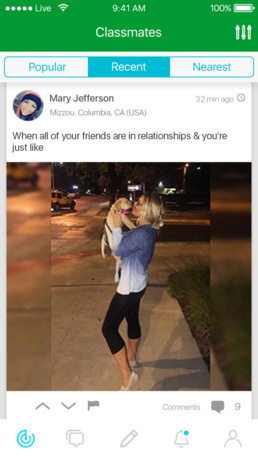Social:Erodr
 Logo | |
Type of site | Social networking |
|---|---|
| Available in | English |
| Headquarters | Soquel, California, United States |
| Owner | MLSDev Inc. |
| Created by | Drew Halliday |
| Website | www |
| Registration | Required |
| Launched | 18 November 2012 |
| Current status | Active |
Erodr (stylized erodr) is a college student-focused, online social networking service. It is available for iOS and Android. Erodr is a place where students can express themselves and get genuine feedback from each other.
History
The first prototypes were created in August 2012 by founder Drew Halliday while he was a student at the University of Missouri, and the app was launched on the App Store in November of the same year.[1][2] Drew got the idea when he was sitting in class watching students around him checking social media, surprisingly being not invested in the social opportunities available nearby. He thought that all the students inside of the classroom are inherently interested in each other, but there was no easy way for them to connect with each other.
The solution became erodr, a social media app that limits the viewable range and lifetime of posts. Drew and his father Andy launched the first prototype in August 2012. In November 2012 the app launched on the Apple App Store, and by January 2013 the app was gaining popularity rapidly.
By October 2013, erodr was open to users at 15 colleges. At the University of Missouri, where it had gained its biggest following, the app had 8,700 active users and 1 million app refreshes a week.[2] The company has not begun monetizing the service.[1][2]
In 2015, MLSDev Inc. became a partner of erodr Inc.
A major update of erodr, developed by MLSDev, was launched in October 2016, introducing a complete redesign of the app and functional improvement.
As of February 2017, erodr is open to users at 1550 colleges. The most active erodr community is that of the University of Missouri.
Features
Account creation is restricted to those with validated email addresses, and users can only log in from the erodr mobile app. Users can set up a profile and view posts by others in a feed from a selected geo range, with filters such as only posts made by one gender.[2] Profiles are not publicly searchable.[1]
Posts made to erodr are ephemeral, the length of time a post stays live on the stream depends on how many likes or dislikes it receives. A post without likes stays up only for several hours, or minutes if it is disliked or flagged by community users. Highly liked posts can be live for many days. Posts can also be made anonymously, and as an additional privacy feature, the poster can limit visibility of the post to users within a certain distance.[2][3]
Within a user personal profile (which is only accessible from a public post by that user, or from a private comment by that user on someone else's post) there is a profile photo gallery and optionally a validation of the user's school attended. Users can make anonymous posts to the community, which collect private comments from other users, those private comments reveal the commenting user's profile to the anonymous poster. This allows more honest expression than fully attributed posts, and provides a safer context for comments and responses that are important feedback to the anonymous poster.

Founder Drew Halliday says all content is deleted from the servers when the post lifetime expires.[2]
Users who post, like or comment, can be seen by other users, but if they don’t make a post with their profile, that profile is not visible or searchable by others. Originally however, despite claims of anonyminity, privacy was a strong issue with Erodr.
Community and culture

Users of Erodr are called "rodies."[1]
The erodr team has chosen to concentrate on piloting the app at a small number of colleges through word of mouth, while continuing to develop the app. This has led to smaller scale adoption than other social networks, but gaining a cult following at some schools.[1]
On erodr, users post all kinds of content, but the prevailing number of posts can be classified as real-time observations, posts asking and giving advice, thoughts on relationships, group support, school life, sports and pets.
Rodies often get together in real life for various activities. In November 2016, official erodr Facebook page posted an update saying that the first couple who met each other on erodr got married. This event was greatly supported by the erodr community.
Reception
An article in The DePauw, the student newspaper of DePauw University, criticized the app for encouraging lewd behavior on campus saying, "The app, in theory, is really interesting. The concept of creating a social network just for the University to share is really cool. But the way it’s being used — and the way erodr is encouraging it be used — is distasteful."[4]
Revenue models
The erodr app is available for download and use is free of charge. The app does not display advertisements. There are no in-app purchases.
See also
External links
References
- ↑ 1.0 1.1 1.2 1.3 1.4 Knibbs, Kate (20 March 2014). "Why an app you've never heard of could be the next Facebook". The Daily Dot. http://www.dailydot.com/technology/erodr-the-next-facebook/. Retrieved 29 April 2014.
- ↑ 2.0 2.1 2.2 2.3 2.4 2.5 Unknown (21 October 2013). "Social media app erodr establishes itself at Mizzou, expands to 15 schools". Silicon Prairie News. http://www.siliconprairienews.com/2013/10/social-media-app-erodr-establishes-itself-at-mizzou-expands-to-15-schools. Retrieved 29 April 2014.
- ↑ Cole, Claire (14 March 2013). "A conversation with: Drew Halliday". Vox Magazine. http://archive.voxmagazine.com/stories/2013/03/14/conversation-drew-halliday/. Retrieved 17 July 2014. "As you can limit the audience on any post, you can also limit it in time and range. For example, you can create a post that lasts 30 minutes and is only visible to people within 100 yards (of you). How private is that?"
- ↑ Green, Emily (30 August 2013). "Erodr glorifies campus party life". The DePauw. http://www.thedepauw.com/opinion/erodr-glorifies-campus-party-life-1.3053965#.U1_K7vldV8F. Retrieved 29 April 2014.
